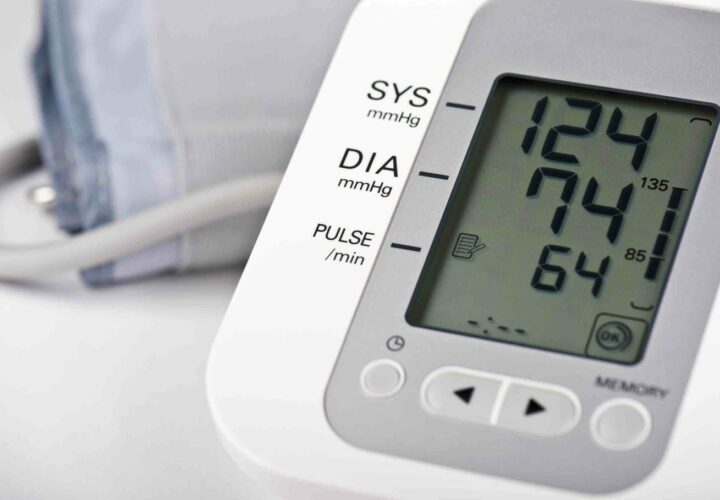More than a billion people worldwide have high blood pressure — but without symptoms, the majority have no idea. Seeking out treatment can reduce a person's chances of getting Alzheimer’s and other dementias by over 40%.
More than one billion adults worldwide have high blood pressure, but since it doesn’t often cause symptoms, half of them don’t even know they have it. Also called hypertension, high blood pressure puts people at higher risk of heart disease and stroke. Now, in one of the largest studies to date, researchers have found that when people with hypertension go untreated, their risk of Alzheimer’s disease rises significantly, too.
The study, published in the journal Neurology, found that older adults with untreated hypertension had a 42 percent higher chance of developing Alzheimer’s than those who received treatment. High blood pressure doesn’t directly cause Alzheimer’s but significantly increases the baseline risk. For example, people aged 65 have a two percent chance of developing Alzheimer’s over a year. With untreated hypertension, it goes up to 2.84 percent. Getting it under control can bring that back down to the baseline two percent.
People with untreated hypertension, or those whose medications weren’t working well, were also at an increased risk of developing other forms of dementia.
Meanwhile, according to lead author Dr. Matthew Lennon at the University of New South Wales in Australia, treating hypertension meant better brain health well into a person’s older years.
“Those with treated hypertension had lower risk of Alzheimer’s dementia throughout their 60s, 70s, and 80s,” Lennon told Being Patient, .
While hypertension alone doesn’t cause Alzheimer’s or other forms of dementia, it is a significant contributor.
Lennon explained that high blood pressure increases inflammation and reduces blood flow to the brain — both risk factors for neurodegenerative diseases including Alzheimer’s and vascular dementia. These two types of dementia are distinct — affecting different parts of the brain and causing different symptoms. In vascular dementia, the parts of the brain responsible for higher-order thinking and problem-solving are affected first.
High blood pressure has another effect specific to Alzheimer’s disease: It impairs the brain’s ability to clear out beta-amyloid plaques — problematic proteins that clump up in the brains of people with the disease.
Lennon and colleagues looked at health data, including blood pressure measurements for 31,250 adults over 60 who didn’t have dementia. They were from 14 countries across six continents.
What’s the Deal With Blood Pressure, Cholesterol and Alzheimer’s Risk?
Over four years, the researchers analyzed participants’ blood pressure and checked whether they had been diagnosed with or treated for hypertension. Nine percent of people in the study had untreated high blood pressure, 51 percent were taking medication for it, and 36 percent did not have high blood pressure. Researchers were uncertain about the other four percent.
Taking into account age, sex, and education, people with unmedicated high blood pressure not only had a higher risk of Alzheimer’s but also increased the chances of developing other forms of dementia by 69 percent. Treating high blood pressure reduced the risk of developing Alzheimer’s back to baseline but didn’t fully mitigate the risk for other dementias, including vascular dementia.
Lennon noted that the diagnostic criteria used in the study can’t differentiate between Alzheimer’s and vascular dementia. Study participants didn’t undergo biomarker-based diagnostics like amyloid PET scans, lumbar punctures, and blood tests to confirm the diagnosis. As a result, some people with vascular dementia may have been diagnosed with Alzheimer’s in this study — making it difficult to say for sure whether treating high blood pressure mitigates the risk of vascular dementia.
People in developing countries were more likely to have untreated hypertension. Though high blood pressure was more prevalent in participants from African and Latin American countries, ethnicity did not affect how well someone responded to treatment.
That, Lennon said, is promising: “It suggests that optimal care for one group will be similar for others,” he noted.
Figuring out if someone’s blood pressure puts them at risk of Alzheimer’s or other dementias can’t be done in one doctor’s appointment. Lennon said that the researchers needed to gather multiple blood pressure measurements over time to determine if someone was at risk.
“Only 28 percent of those with high blood pressure have it under control,” Lennon said. “While you might not feel the consequences of that high blood pressure immediately, it is really important that you keep a close eye on it and bring it under control if you want to maximize your chance at a longer, happier, healthier life.”
Approved blood pressure medications might also have an unexpected effect, helping slow cognitive decline. Researchers are currently conducting a small Phase 2 clinical trial testing the blood pressure drug bumetanide to see if it could slow cognitive decline in people in the earliest stages of Alzheimer’s who don’t have high blood pressure. The trial is expected to finish in 2025, and if the drug shows promise, researchers will conduct a definitive trial to see whether it’s effective.




